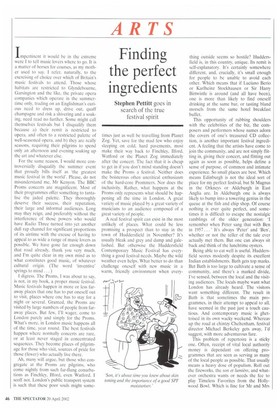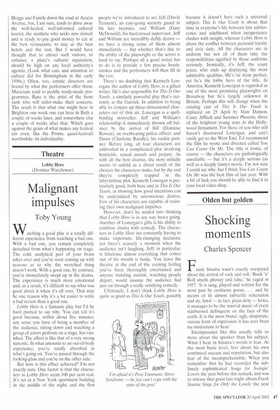Finding the perfect ingredients
Stephen Pettitt goes in search of the true festival spirit
Impertinent it would be in the extreme were Ito tell music lovers where to go. It is a matter of horses for courses, as my mother used to say. I refer, naturally, to the exercising of choice over which of Britain's music festivals to attend. Those whose habitats are restricted to Glyndebourne, Garsington and the like, the private opera companies which operate in the summertime only, trading on an Englishman's curious need to dress up, drive out, quaff champagne and risk a shivering and a soaking, need read no further. Some might call themselves festivals but I disqualify them because a) their remit is restricted to opera, and often to a restricted palette of well-seasoned opera, and b) they are really seasons, requiring their pilgrims to spend only an afternoon and evening soaking up the art and whatever else.
For the same reason, I would more controversially disqualify the summer event that proudly bills itself as 'the greatest music festival in the world'. Please, do not misunderstand me, Mr Kenyon. The BBC Proms concerts are magnificent. Most of their programmes offer something to tantalise the jaded palette. They thoroughly deserve their success, their reputation, their large and informal audiences. Long may they reign, and preferably without the interference of those powers who would have Radio Three turned into yet another dull rap channel for significant proportions of its airtime with the excuse of having to appeal to as wide a range of music lovers as possible. We have gone far enough down that road already, thank you very much, and I'm quite clear in my own mind as to what constitutes good music, of whatever cultural origin. (The word 'inventive' springs to mind ... ) I digress. The Proms, I was about to say. is not, in my book, a proper music festival. Music festivals happen in more or less faraway places that one has to put oneself out to visit, places where one has to stay for a night or several. Granted, the Proms are visited by large numbers of people from faraway places. But few. I'll wager, come to London purely and simply for the Proms. What's more, in London music happens all of the time, year round. The best festivals happen where normally concerts are rare, or at least never staged in concentrated sequences. They become places of pilgrimage for those who visit, sources of pride for those (fewer) who actually live there.
Ah, many will argue, but those who congregate at the Proms are pilgrims, who come nightly from such far-flung conurbations as Finchley, Ilford, even Watford. I scoff not. London's public transport system is such that these poor souls might some times just as well be travelling from Planet Zog. Yet, save for the mad few who enjoy sleeping on cold, hard pavements, most make their way back to Finchley, Ilford, Watford or the Planet Zog immediately after the concert. The fact that it is cheap to get in if you don't mind standing doesn't make the Proms a festival. Neither does the boisterous often uncritical enthusiasm of the hard-core Prommers. Nor does the inclusivity. Rather, what happens at the Proms only represents what should be happening all the time in London. A great variety of music played by a great variety of musicians to an audience composed of a great variety of people.
A real festival spirit can exist in the most unlikely of places. What could be less promising a prospect than to stay in the town of Huddersfield in November? It's usually bleak and grey and damp and galelashed. But otherwise the Huddersfield Contemporary Music Festival has everything a good festival needs. Maybe the wild weather even helps. What better to do than challenge oneself with new music in a warm, friendly environment when every thing outside seems so hostile? Huddersfield is, in this country, unique. Its remit is self-explanatory. It's certainly somewhere different, and, crucially, it's small enough for people to be unable to avoid each other. Which means that if Luciano Berio or Karlheinz Stockhausen or Sir Harry Birtwistle is around (and all have been), one is more than likely to find oneself drinking at the same bar, or tasting bland morsels from the same hotel breakfast buffet.
This opportunity of rubbing shoulders with the celebrities of the biz, the composers and performers whose names adorn the covers of one's treasured CD collection, is another important festival ingredient. A feeling that the artists have come to join the community, and are not simply flitting in, giving their concert, and flitting out again as soon as possible, helps define a sense of purpose, of common and intimate experience. So small places are best. Which means Edinburgh is not the ideal sort of place for my perfect festival, but St Magnus in the Orkneys or Aldeburgh in East Anglia are. In Aldeburgh one is always likely to bump into a towering genius in the queue at the fish and chip shop. Of course nothing is ever quite perfect, and sometimes it is difficult to escape the nostalgic ramblings of the older generation: 'I remember when Peter sang that with Ben in 1957 ... It's always 'Peter' and 'Ben', whether or not the teller of the tale ever actually met them. But one can always sit back and think of the lunchtime oysters.
Being able to eat well is useful. Huddersfield scores modestly despite its excellent Indian establishments. Bath gets top marks. But Bath is too large to cultivate a sense of community, and there's a marked divide, I've sensed, between the local and the visiting audiences. The locals maybe want what London has already heard. The visitors want something different. The result in Bath is that sometimes the main programmes, in their attempt to appeal to all, have seemed in the past just a touch cautious. And contemporary music is ghettoised in its own wacky weekend. Whereas up the road at chintzy Cheltenham, festival director Michael Berkeley gets away, I'd suggest, with more adventurous fare.
This problem of repertoire is a sticky one. Often, receipt of vital local authority money is dependant on offering programmes that are seen as serving as many of the local people as possible. That usually means a heavy dose of populism. Roll out the fireworks, the son et lumiere, and whatever orchestra wants or needs the fee to play Timeless Favorites from the Hollywood Bowl. Which is fine for Mr and Mrs Bloggs and Family down the road at Acacia Avenue. but, I am sure, tends to drive away the well-heeled, well-informed cultural tourist, the aesthete who seeks new stimuli and is ready to pay good money to eat at the best restaurants, to stay at the best hotels and the rest. But I would have thought that to attract such visitors, to enhance a place's cultural reputation, should be high on any local authority's agenda. (Look what care and attention to culture did for Birmingham in the early 1990s.) Often, too, artistic directors are bound by what the performers offer them. Musicians tend to peddle ready-made programmes. Rare is the artist of the front rank who will tailor-make their concerts. The result is that what one might hear in Brighton one week one can hear in Bath a couple of weeks later, and somewhere else a couple of weeks after that. Which goes against the grain of what makes any festival (or even, like the Proms, quasi-festival) worthwhile: its individuality.







































































 Previous page
Previous page